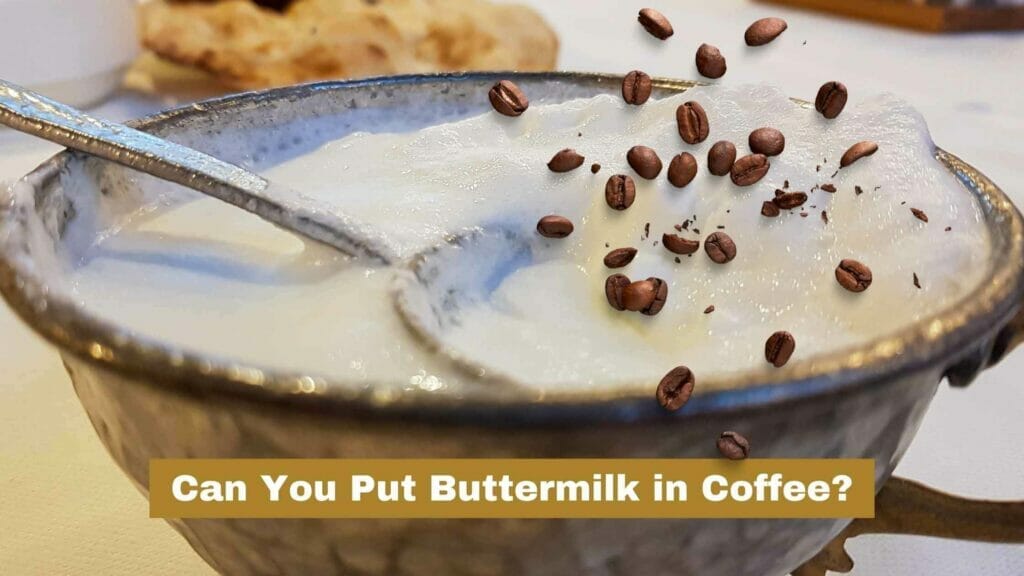
You might consider adding buttermilk to coffee when you have nothing else in your fridge. But can you put buttermilk in coffee? Here’s the deal. Buckle up; it’s a pretty intense ride when you start researching it.
You technically can put buttermilk in coffee. However, using buttermilk in coffee is very strongly not recommended by most coffee drinkers everywhere.
Buttermilk is sour and has a thick, grainy consistency when mixed with coffee. It will ruin the taste of your coffee, and the health benefits you can get from using it are easier to find and enjoy in other options, including skim milk or plant-based milk!
Using buttermilk in coffee is even taboo in many coffee forums! Take a look at this intriguing and heated debate!
Key Takeaways:
- You can technically put buttermilk in coffee, but it is strongly not recommended.
- Buttermilk in coffee has a sour taste and a thick, grainy consistency which can ruin the flavor of the coffee.
- It is low in calories and fat and could be considered a healthier alternative to full-fat milk or creamers.
- Buttermilk in coffee is viewed as taboo among most coffee enthusiasts, who prefer other flavorings.
- It does not taste good in coffee, and even a small amount can drastically alter the coffee’s flavor.
- While buttermilk has long been considered a good health choice in cooking, it is not recommended for use in coffee.
- Better alternatives to buttermilk for coffee include low-fat milk or creamer, plant-based milk, butter, or simply drinking coffee black.
What is buttermilk?
At first, using creamy buttermilk sounds pretty great, right? It’s popular in baking, after all! Understanding why it doesn’t work in coffee, in particular, is about understanding what buttermilk is. It’s the fermented dairy that’s left over in the separation process. It is low in calories and fat yet still thick and creamy. This is often what makes it alluring for baking.
However, buttermilk is very sour and has high acidity. While that’s something that can benefit your baking, with the flavor combinations, neither of those things will do well with sensitive coffee! Especially if you are trying to avoid acidity from coffee in the first place.
Fun Fact: Did you know you can enjoy less acidity in nitrogen-infused coffee? Click on the link to learn more!
Pros and cons of using buttermilk in coffee
Despite this rather gross conversation starter, there are positive and negative parts to considering using buttermilk in coffee. I’ve outlined them below to help you understand what you can expect.
Pros of buttermilk in coffee
- Low in calories and low in fat
- Good source of calcium
Cons of using buttermilk in coffee
- Sour taste
- Tricky to mix in properly
- Can ruin coffee’s flavor and consistency
As you can see, the cons visually outweigh the pros. But let’s dive in with more detail to better understand what we can expect. Generally, the main benefit of buttermilk in coffee is that it is a healthy choice compared to full-fat milk and creamers. It’s also affordable, and most people have it in their homes when baking or cooking. That being said, there are much better options for making a healthier choice, comparatively, so it’s a decent choice, but the best choice!
The main disadvantages are that it is a poor-tasting alternative for dressing up your coffee! It offers a change in texture and easily destroys the overall taste of your coffee.
Very few people enjoy buttermilk as a choice for their coffee drinking. It’s just an option most people will want to try once and then never again!
Is buttermilk good as a coffee creamer?
I can understand if you’re still asking this question. After all, it is tempting to consider this rich and decadent creamy choice.
However, you’ll want to resist the temptation. Buttermilk is inferior to any and all types of creamer. In fact, buttermilk in coffee is almost taboo! In a world where most people are open and relatively liberal about exploring coffee variations and flavors, buttermilk is a “no-go zone.”
That tells you just how strongly people don’t support the idea of buttermilk in coffee, right? Those who are neutral on it, let alone enjoy it, are very, very few. They’re also very quiet in forums since so many are against it!
Does buttermilk taste good in coffee?
Nope. Buttermilk does nothing good for the flavor of your coffee, and it does a lot of bad for it. Since coffee is naturally sensitive and absorbent, changing its overall flavor doesn’t take much. You can see this really strongly with buttermilk.
Even if you add as little as a tablespoon (15 g) to your coffee, it’ll destroy the taste of your coffee. It’s sour, curdles your coffee, and makes it silty or grainy. There’s nothing positive in the flavor of this combination at all!
Is buttermilk in coffee healthy?
Technically, buttermilk is a healthy choice in your coffee. As I mentioned above earlier, it is low in calories and fat. This is one of the main reasons many people consider it a substitute for full-fat milk or creamer for their coffee.
Buttermilk has long been seen as a great health choice in things like fried batter (for chicken or fish), using in sourdough bread, and even in making buttermilk pancakes! It’s important to note that buttermilk is a delicious staple in cooking and baking, and I’m not trying to say otherwise!
Ensure you avoid the understandable temptation to use it in your coffee! All it takes is one try, and you’ll understand from one sip why it’s so strongly recommended against as a choice!
Many people who ask this question online are strongly recommended against trying it just because it is so disgusting. The respondents are just trying to help coffee lovers avoid this negative experience. It’s kind of them, of course, but a little alarming to the casual researcher looking for some information.
You see? I told you this was a heated debate topic online! I was shocked to find this when I was taking a look around. Online people take their coffee really seriously! No one knows where the notion of adding buttermilk to coffee really came from. However, despite the popular question, it’s not an idea that’s gotten much traction over the years.!
Calories content of buttermilk in coffee
If you are still a little curious, no worries. Calorie-wise, buttermilk is pretty good! One tablespoon (15 g) will come in at about six calories, according to Nutritionix. You can see why it’s so tempting to consider it for your coffee.
Hopefully, the above explanations will help you see why it isn’t worth consideration, though!
What should you put in coffee instead of buttermilk?
Now that you’re starting to understand why buttermilk isn’t the way to go for your coffee, it may leave you wondering what you should be trying instead! Interestingly enough, the most common substitution is butter! Butter in coffee is highly recommended, especially over the use of buttermilk.
There are other diet-friendly options that you can consider, of course. The most common choices are low-fat milk or creamer. There is also plant-based milk, which often is lower in fat and higher in other additives like vitamins and minerals without the sweetness of creamer. You can also consider something like a powdered creamer or simply skip over it and drink coffee black.
FAQ: Buttermilk in Coffee
What exactly is buttermilk?
Buttermilk is the liquid left behind after churning butter out of cream. It is a fermented dairy product that is lower in fat yet still thick and creamy, often used in baking due to its high acidity and tangy flavor.
What can you use instead of buttermilk?
In baking, you can usually substitute buttermilk with yogurt or a mixture of milk and vinegar/lemon juice. For coffee and other beverages, alternatives like low-fat milk or creamer, plant-based milk, or butter are popular choices.
Can I use coffee instead of milk in a buttermilk coffee cake recipe?
Coffee can be used as a substitute in cake recipes but it might change the taste and consistency of the cake. It is usually recommended to use milk as it helps keep the cake moist and adds a creaminess to the batter.
If I usually add cream to my coffee, can I use heavy cream instead of buttermilk?
Absolutely. Heavy cream will give your coffee a thick, rich taste and texture, which could be more enjoyable than the tanginess and thickness of buttermilk.
What’s the difference between adding almond milk and buttermilk to your morning cup of coffee?
A: Almond milk is often lighter in taste and consistency than buttermilk, and doesn’t curdle when mixed with coffee. Buttermilk, on the other hand, has a tangy, sour taste and can curdle when added to hot drinks like coffee.
I love adding dairy to my coffee. Can I use buttermilk as a dairy product in coffee?
While buttermilk is indeed a dairy product, it’s not recommended for coffee due to its sour taste and the likelihood of it curdling in the heat. Better alternatives would be regular or plant-based milks or creamers.
How does the taste of coffee change when you add buttermilk instead of regular milk?
Buttermilk can drastically alter your coffee’s flavor due to its high acidity and sour taste. It may also curdle, giving the coffee a grainy texture. Regular milk gives coffee a creamy, smooth texture and enhances its natural flavours without overpowering them.
As you can see, there is much to say about the taboo and highly heated debate on adding buttermilk to coffee! It certainly surprised me since there is so much originality and exploration on the internet! At any rate, buttermilk is technically possible in coffee but not at all recommended. It sours coffee and often curdles it. It will add a grainy texture and won’t be worth drinking since coffee is naturally a very sensitive “food” group.
While it makes sense to consider buttermilk from a health perspective, there are many ways in which you can explore healthier choices for your coffee without dipping into this taboo topic!
Know someone who tends to explore wildly that you want to warn? If so, share this article with them to save them the trouble and stress! Not to mention that it’ll also save them from a wasted cup of coffee!
